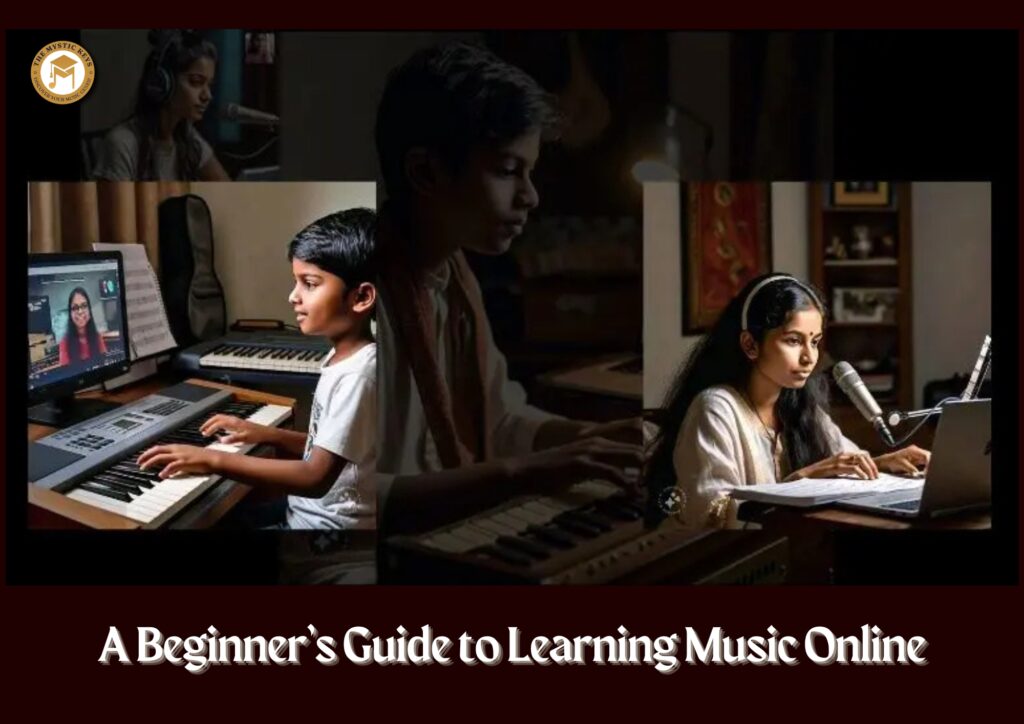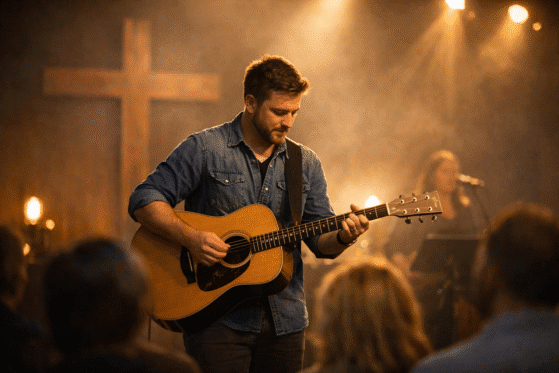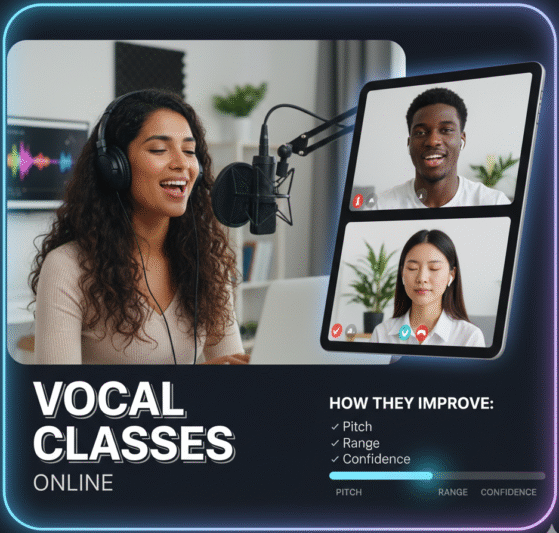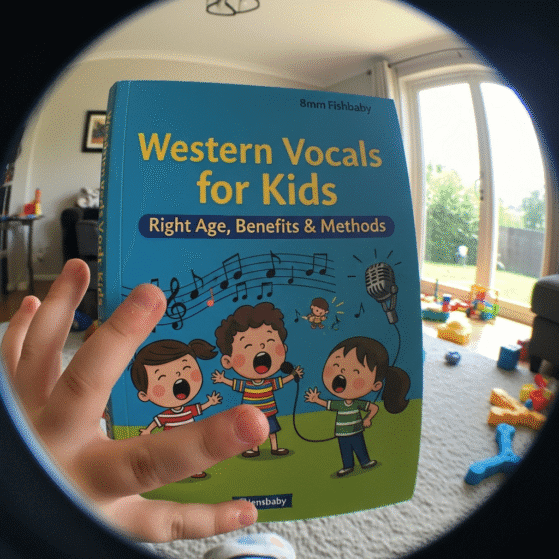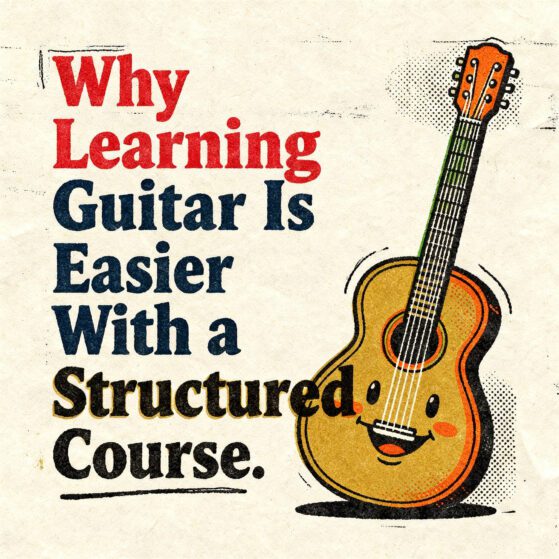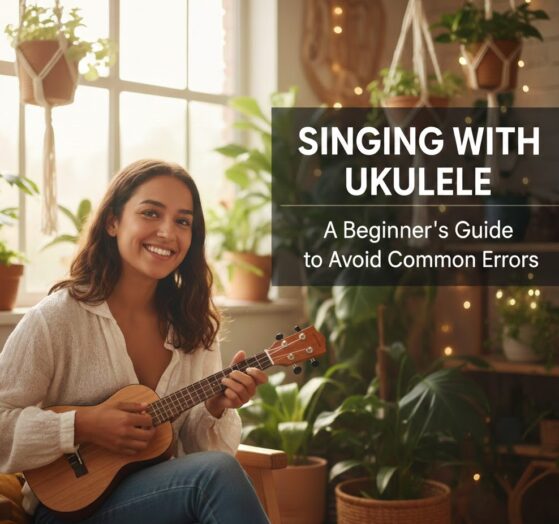A Beginner’s Guide to Learning Music Online
In today’s digital world, learning music has become more accessible than ever before. Whether you’ve always been interested in music but never had the chance to pursue it, or you’re looking to build on your existing skills, online music lessons provide incredible opportunities. Moreover, with flexible schedules and a wide range of courses, you can learn at your own pace. Therefore, this beginner’s guide will help you navigate the process of learning music online by offering essential tips, step-by-step strategies, and valuable resources to set you on the right path.
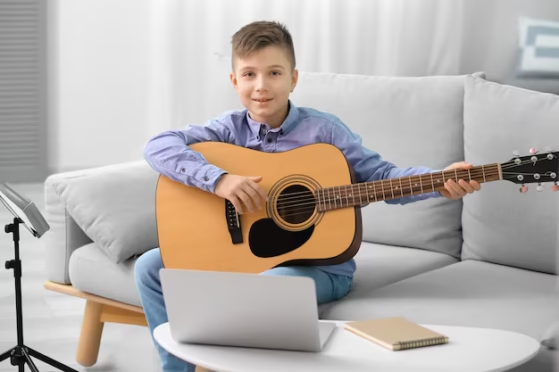
Why Choose Online Music Learning?
Before diving into the how-to, let’s first understand the many reasons why online music education is a great option:
- Convenience: You can learn at your own pace, in your own space. No need to commute to a music school or schedule lessons around rigid time slots.
- Affordable: Online music lessons tend to be more affordable than traditional face-to-face lessons, making music education more accessible.
- Variety of Courses: Whether you’re interested in playing the guitar, piano, drums, or exploring music theory, online platforms offer a wide variety of courses for different instruments and genres.
- Expert Teachers: Many online platforms bring expert teachers from around the globe right into your home, giving you access to a diverse range of experienced instructors and learning styles.
- Flexibility: You can learn whenever you feel like it. No matter where you are in the world, you can access music lessons at any time of day or night.

Choosing the Right Platform
The first step in your online music learning journey is choosing the right platform. While there are many options available, it’s important to find one that aligns with your goals, learning style, and budget. Here are some of the most popular platforms:
- YouTube: A treasure trove of free lessons for nearly every instrument imaginable. You can find lessons ranging from beginner to advanced levels. However, you’ll need to filter through content to find reputable teachers and structured learning pathways.
- Udemy or Skillshare: Both of these platforms offer courses on everything from learning an instrument to music theory. You can purchase courses that you can keep forever, offering flexibility in learning at your own pace.
- MasterClass: Known for its high-quality courses, MasterClass brings expert musicians from around the world to teach music. It’s not as comprehensive for beginners as other platforms, but it is perfect for gaining insights from top artists.
- Private Online Music Schools (Like The Mystic Keys): Platforms offering one-on-one lessons with professional instructors can provide personalized feedback, structured learning plans, and a more interactive experience. These platforms might offer subscriptions or pay-per-lesson rates, but the depth of instruction can be invaluable.
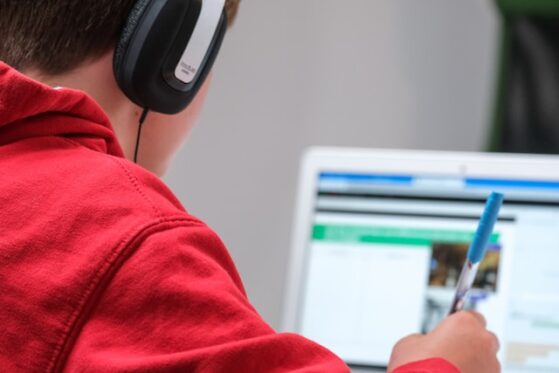
Setting Clear Goals
Before you start your lessons, it’s important to define your music learning goals. What do you want to achieve? Do you want to learn the piano, start singing, master guitar techniques, or dive into music theory? Knowing your goals will help you choose the right lessons and keep you motivated.
Here are some questions to help you clarify your goals:
- What instrument do I want to learn?
- What genre of music excites me the most?
- Do I want to focus on reading music, playing by ear, or both?
- How much time can I commit to learning every week?
- Do I want to learn for fun or work toward something more serious, like performing or composing?
Setting specific and measurable goals will not only help you stay focused but will also provide a clear sense of accomplishment as you progress.

Picking Your First Music Course
Once you’ve identified your goals, it’s time to choose the right course. The perfect course should be one that aligns with your goals, fits your learning style, and is appropriate for your skill level.
If you’re a complete beginner, look for courses that introduce basic concepts:
- Instrument-Specific Courses: If you’re learning an instrument, look for lessons that teach foundational techniques. For instance, if you’re learning piano, look for beginner courses that teach how to read music, basic chords, and simple songs.
- Music Theory Courses: Learning music theory helps you understand the language of music, enabling you to read sheet music, build scales, and understand song structures.
- Ear Training Courses: These courses help you develop your ability to recognize musical elements like pitch, rhythm, and harmony. Being able to play by ear is an essential skill for any musician.
- Vocals Courses: If singing is your focus, look for vocal training courses that focus on techniques like breath control, pitch, vocal range, and articulation.
It’s best to start with introductory lessons and progress at a pace you’re comfortable with. Remember, you don’t need to rush—building a strong foundation is key to long-term success.

Developing Consistent Practice Habits
Consistency is key to learning music, especially when you’re learning online. Without the structure of a traditional music class, it can be easy to fall off track, so it’s important to develop a practice routine.
Here are some tips for effective practice:
- Set a Schedule: Decide how many days per week you can dedicate to practice. Even 15 minutes a day can yield great results over time. Stick to a consistent practice schedule to form a habit.
- Focus on Technique: In the beginning, focus more on developing good habits than speed or complexity. Spend time practicing basic scales, finger exercises, and basic pieces.
- Break It Down: If you’re learning a piece of music, break it down into smaller sections. Focus on one section at a time, and practice slowly before gradually increasing your speed.
- Use a Metronome: A metronome helps keep you in time and can improve your rhythm and timing, which are vital skills for any musician.
- Track Progress: Keep a practice journal where you note what you worked on each day. This will help you track your progress and motivate you when you see how far you’ve come.
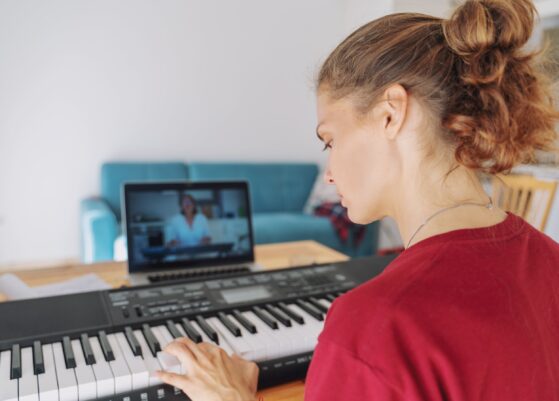
Using Online Resources to Supplement Learning
In addition to your main lessons, there are plenty of resources available online to support your music journey:
- Music Apps: Apps like GarageBand or MuseScore allow you to compose, record, and arrange music, which can be helpful when practicing or experimenting with your skills.
- YouTube Tutorials: There are countless free music tutorials online. Whether it’s learning a new song or mastering a specific technique, YouTube has something for everyone.
- Sheet Music Websites: For pianists, guitarists, and vocalists, websites like MusicNotes and IMSLP offer sheet music that you can use to practice new songs.
- Online Communities: Join online communities like Reddit’s r/music or Discord music servers. You can ask questions, share progress, and learn from fellow learners and musicians.

Getting Feedback and Progressing
Receiving feedback is essential for growth. While online music learning offers great flexibility, it can also make it difficult to get immediate feedback on your progress. To address this, consider incorporating live feedback into your practice routine.
- Private Lessons: Many online platforms offer one-on-one lessons with experienced teachers. Personalized feedback can help you correct mistakes, improve techniques, and stay motivated.
- Recording Yourself: Regularly record your practice sessions to evaluate your progress. Listening back can reveal areas that need improvement that you might not have noticed while playing.
- Engage with Others: Don’t hesitate to share your progress with friends, family, or online communities. Engaging with others can keep you motivated and provide valuable advice.

Staying Motivated
Learning music online can be a rewarding experience, but it can also come with challenges. Staying motivated is crucial to progressing and achieving your musical goals. Here are some tips:
- Celebrate Small Wins: Learning an instrument is a long-term commitment, and small victories like mastering a new song or technique deserve to be celebrated.
- Connect with Other Learners: Join online groups or find an accountability buddy to share your learning experience with. Motivation is contagious when you surround yourself with like-minded people.
- Create Realistic Expectations: Understand that learning an instrument takes time and patience. Don’t expect overnight results—trust the process.
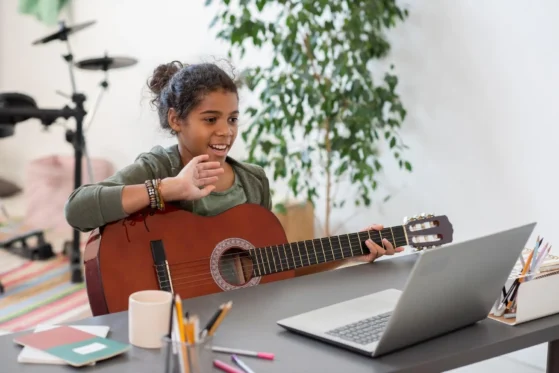
Conclusion
Learning music online is an exciting and rewarding journey that anyone can embark on. To begin with, having the right resources, dedication, and practice will set you on the right path. As you progress, you’ll find yourself improving and developing a deeper understanding and appreciation of music. From selecting the right platform and course to setting goals, practicing regularly, and seeking feedback, each step builds upon the last, bringing you closer to your musical aspirations.
At The Mystic Keys, we understand the unique needs of every learner, whether you’re a complete beginner or an intermediate musician. Our online courses, expert instructors, and personalized approach can help guide you through the learning process and help you build a solid foundation. Ready to begin your music journey? Let’s make beautiful music together!
Related Blogs
The Best Platforms for Learning Music
Online
Learning music has evolved dramatically over the years. Thanks to advancements in technology, aspiring musicians no longer need to rely solely on in-person lessons. In fact, online platforms have revolutionized the way music is taught and learned, offering a wealth of resources for learners at every level.
How One-on-One Music Lessons Are Revolutionizing Online Learning
Online learning has transformed education, extending to niche skills like playing musical instruments. Among the biggest advancements is the rise of 1-on-1 music lessons.
How Online Music Lessons Help Beginners Progress Faster
Learning music has always been an exciting yet challenging journey, especially for beginners. Traditionally, aspiring musicians relied on in-person classes, which required traveling, scheduling flexibility, and direct interaction with teachers.


